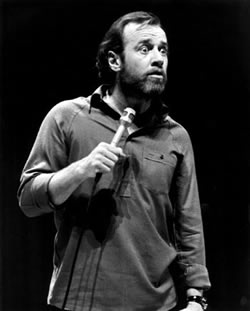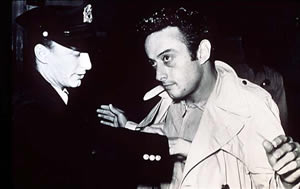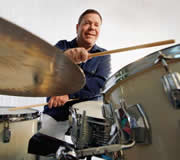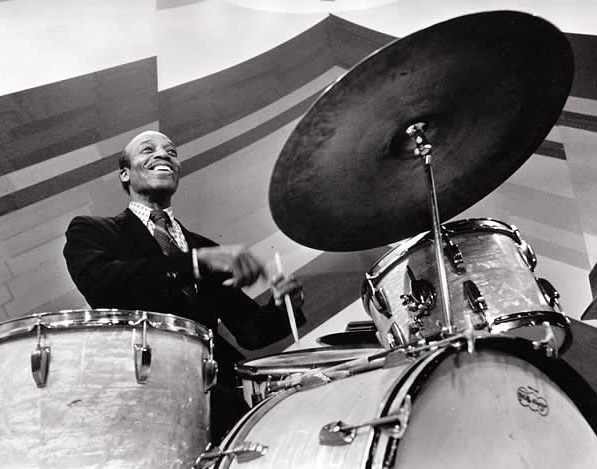George Carlin: Last Jazz Comic Standing
Sunday, June 29th, 2008If Lenny Bruce was the first “jazz comedian,” George Carlin may have been the last.
Bruce, who died in 1966, and Carlin, who passed away on June 22, did not play musical instruments, but they both riffed, improvised, innovated, took risks and chances, and composed spontaneously like the best of the jazz greats.
Both were closely associated with jazz musicians throughout their careers. Bruce appeared in clubs with dozens of jazz legends, and on his one and only television special aired locally in New York city in 1959, available only from JazzLegends.com, he had Buddy Rich, Cannonball Adderley and the jazz singing group of Lambert, Hendricks and Ross, as guests. In the late 1960s, Carlin co-starred with Buddy Rich on “Away We Go,” a summer replacement television show. And, like too many jazz musicians of yore, Bruce and Carlin both had drug problems.
 Bruce and Carlin worked most of the jazz joints when there were such things, and both were busted for obscenity. Bruce was first arrested in 1961 at the Jazz Workshop in San Francisco for uttering a 10-letter word that referred to a sex act, Carlin’s run-in with the law occurred in 1972 at the Milwaukee Summerfest for his “Seven Words You Can Never Say On TV” routine. One of the words in Carlin’s act, by the way, was the very same word Lenny was busted for 11 years earlier.
Bruce and Carlin worked most of the jazz joints when there were such things, and both were busted for obscenity. Bruce was first arrested in 1961 at the Jazz Workshop in San Francisco for uttering a 10-letter word that referred to a sex act, Carlin’s run-in with the law occurred in 1972 at the Milwaukee Summerfest for his “Seven Words You Can Never Say On TV” routine. One of the words in Carlin’s act, by the way, was the very same word Lenny was busted for 11 years earlier.
Bruce first came to fame when the ruling comics were folks like Milton Berle and Jerry Lewis, whose vaudeville roots were at the core of their outlandish physical comedy. In terms of their verbiage, it was pretty much “take my wife, please,” and “a rabbai and a priest were standing on the corner.”
The old-guard comics who labeled Bruce “sick” at the time –like Lewis, Berle, Henny Youngman and the rest, continued to base their humor on physical shortcomings and crass caricatures of women, the Japanese and other ethnic groups, and put down humor in general.
Sample lines? “I’ll take my wife on a vacation to somewhere she’s never been,,,The kitchen!” Or, even better than that, “Why don’t you walk into a parking meter and violate yourself?” These could only be topped by Bob “Peace Corps” Hope’s famed, You’re looking well. What do you hear from your embalmer?”
Hoo boy.
Bruce was simply offended by the hypocrisy of it all, including what he viewed as the hypocrisy of language.
 Like it or not, he changed the course of comedy, and virtually everything we hear today is an extension or modification of what Lenny Bruce did over 40 years ago.
Like it or not, he changed the course of comedy, and virtually everything we hear today is an extension or modification of what Lenny Bruce did over 40 years ago.
Pushing the comedic, linguistic and verbal envelope, Lenny Bruce was revolutionary, much like Charlie Parker and Dizzy Gillespie were when they knocked the jazz world on its rear end as pioneering be-boppers. In the staid 1950s, no one–especially a comic–dared publicly mock things like organized religion, sex, and revered icons like Billy Graham and Eleanor Roosevelt.
And his use of obscenities in his act? Lenny Bruce said over and over again that he only wanted to demonstrate that they were just words. When he repeated one or more of them over, over and over again, you got the point. It was just a word or words.
There was a price to be paid for being revolutionary. Lenny Bruce was arrested on obscenity charges seven times from 1961 to 1964. He was found guilty on two of the charges, with one being reversed after Bruce’s death. On December 23, 2003, 37 years after his death, New York Governor George Pataki posthumously pardoned him.
Like Lenny, George Carlin “worked clean,” for the first several years of his professional career, and was quite successful at it on television, in Vegas and on the club circuit. Coincidently, when Carlin and Jack Burns worked as a comedy team and arrived in Hollywood from Fort Worth in the early 1960s, it was none other then Lenny Bruce who helped them get a booking on the Jack Paar television show. This could have been a result of that fact that, at Bruce’s “Gate of Horn” nightclub obscenity bust in 1962 in Chicago, Carlin was one of two audience members/protestors who was locked up.
In the early 1970s, George Carlin changed his comedic voice and seemingly lifted a good portion of Lenny Bruce’s act and attitude. Showbiz nay sayers thought it was strictly a career move back then. In other words, maybe Carlin saw the handwriting on the wall, dropped the coat and tie and “turned hippie,” strictly for reasons of commerce, much like Bobby Darin did when he lost the toupee, starting singing folk songs and suddenly became “Bob” Darin.
Though it may have been a career move or appeared to be that way in the beginning–the “Seven Words You Can Never Say On TV” bit was eerily similar to several of Bruce’s routines and it was common knowledge that Carlin idolized Lenny–I fervently believe that George Carlin ultimately found his own voice.
Bruce always claimed that his mission was to “hold a mirror up to society.” He didn’t live long enough to do that effectively. I think Carlin did, and in the process, influenced generations of younger, socially aware comics.
If historians chose to write about such things, they might say that the jazz equivalent of George Carlin would be Miles Davis, in that Miles was amongst the very, very few who not only moved along with the times, but was at the forefront of inventing the future.
The ultimate difference between Bruce and Carlin? The times dictated that George Carlin was able to live by a credo that Lenny Bruce could not: That the job of a comic is, by and large, to be funny. Lenny Bruce was hounded and persecuted for his innovations. George Carlin was applauded.
George Carlin was 12 years younger than Lenny Bruce.
Twelve years is a generation, and a generation makes a difference in public perception.
Is there another “jazz comic,” i.e., a pioneer, revolutionary, risk-taking, improvising, riffing innovator and heir to the “jazz comic throne” out there?
Some of the “older guard” are still out there in business. Veteran Pete Barbutti continues to wail on “jazz whisk broom” and play to the band. Mort Sahl, a politicial and moral firebrand of the late 1950s and rival of Lenny Bruce’s, is pitching at the age of 80, though history has long passed him by. Likewise another 1950s icon named Shelly Berman, who pretty much sticks to acting these days.
If there is any worthy successor to the Lenny Bruce/George Carlin seat, that would be Jon Stewart. Stewart embodies the literacy, the intelligence, wit and irreverence of guys like Lenny, Carlin, Richard Pryor and Sam Kinison, coupled with a respect for the tradition of those who maintain that the job of a comic is, as Dean Martin once said, “to be funny.” Stewart is satirist and an irreverent, political pundit among other things, and he consistently holds a mirror up to society. Sound familiar?
Tune in his program on “The Comedy Channel.” Jon Stewart has it all. George and Lenny would be proud.
And maybe Stewart even likes jazz…






